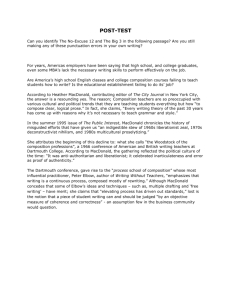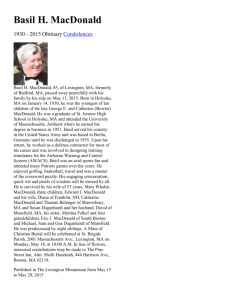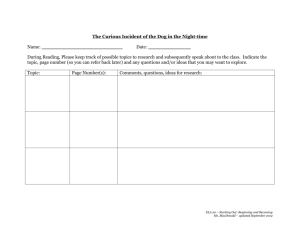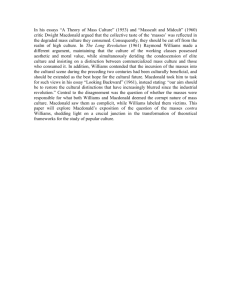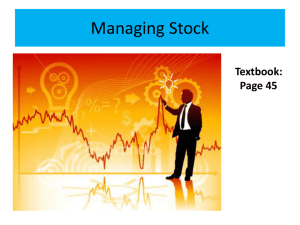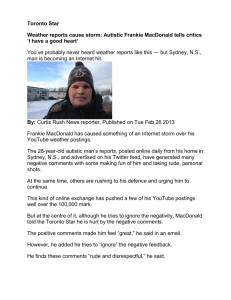the Full Review
advertisement
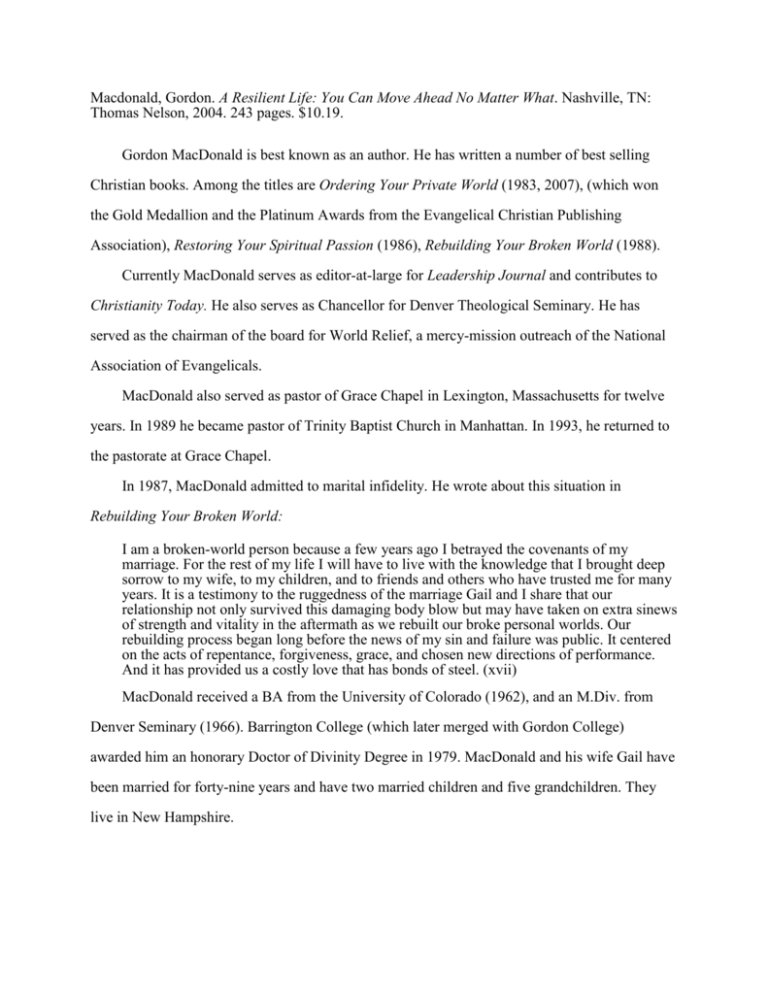
Macdonald, Gordon. A Resilient Life: You Can Move Ahead No Matter What. Nashville, TN: Thomas Nelson, 2004. 243 pages. $10.19. Gordon MacDonald is best known as an author. He has written a number of best selling Christian books. Among the titles are Ordering Your Private World (1983, 2007), (which won the Gold Medallion and the Platinum Awards from the Evangelical Christian Publishing Association), Restoring Your Spiritual Passion (1986), Rebuilding Your Broken World (1988). Currently MacDonald serves as editor-at-large for Leadership Journal and contributes to Christianity Today. He also serves as Chancellor for Denver Theological Seminary. He has served as the chairman of the board for World Relief, a mercy-mission outreach of the National Association of Evangelicals. MacDonald also served as pastor of Grace Chapel in Lexington, Massachusetts for twelve years. In 1989 he became pastor of Trinity Baptist Church in Manhattan. In 1993, he returned to the pastorate at Grace Chapel. In 1987, MacDonald admitted to marital infidelity. He wrote about this situation in Rebuilding Your Broken World: I am a broken-world person because a few years ago I betrayed the covenants of my marriage. For the rest of my life I will have to live with the knowledge that I brought deep sorrow to my wife, to my children, and to friends and others who have trusted me for many years. It is a testimony to the ruggedness of the marriage Gail and I share that our relationship not only survived this damaging body blow but may have taken on extra sinews of strength and vitality in the aftermath as we rebuilt our broke personal worlds. Our rebuilding process began long before the news of my sin and failure was public. It centered on the acts of repentance, forgiveness, grace, and chosen new directions of performance. And it has provided us a costly love that has bonds of steel. (xvii) MacDonald received a BA from the University of Colorado (1962), and an M.Div. from Denver Seminary (1966). Barrington College (which later merged with Gordon College) awarded him an honorary Doctor of Divinity Degree in 1979. MacDonald and his wife Gail have been married for forty-nine years and have two married children and five grandchildren. They live in New Hampshire. Summary of the Book MacDonald writes a reflective piece on the subject of resilience fifty years and many challenges after his time at the Stony Brook School, a college prep school in Long Island, New York. In school, MacDonald was a long-distance runner. The coach, Marvin W. Goldberg, was more than a track coach; he was a life-distance coach. He mentored his runners for life, not just competition. This book intertwines long-distance disciplines for running with long-distance life disciplines for Christian living. MacDonald writes, “As the years have gone by and I have thought a thousand times about my days on Stony Brook’s dirt running track, I have concluded that my basic formulation of the Christian life was forged there under Marvin Goldberg’s’ coaching” (xix). MacDonald credits the coach with developing resilience in his boys that provided the “footprint” for the book. “For the resilient life – getting stronger as I get older – is developed much the same way Marvin Goldberg built his athletes” (xxi). Other authors have written about resilience in the pastorate. Eugene H. Peterson has contributed at least three: The Contemplative Pastor (1989), Under the Unpredictable Plant: An Exploration in Vocational Holiness (1992), and Five Smooth Stones for Pastoral Work (1980). Each of these books addresses the need for the pastor to renew his strength under demanding circumstances in order to fulfill his shepherding call. One other title deserves mention. Glenn E. Ludwig’s In it for the Long Haul: Building Effective Long-term Pastorates (2002). The Alban Institute, which published Ludwig’s book, is an independent center focused on the changing needs of congregations and Christian leaders. Critical Evaluation If you are a pastor interested in a strong finish in your ministry, you should read MacDonald’s book because a pastor’s life and ministry are inextricably bound together. MacDonald has his eye on the finish-line of life which is where he will end his work in ministry. I just crossed the sixty-year old mileage marker and more than at any time in my forties or fifties, I feel the breezes coming from the horizon of eternity out ahead. I started asking questions I could not yet formulate. I found that frustrating. Then I read MacDonald’s book with the singular most impressive chapter in it entitled, “Resilient People Foresee the Great Questions of Life’s Passage” and found some help. Before we get to that chapter, let me explain how the book is organized. Life is divided into five sections each with a few chapters that unpack the main theme. Each section begins with a short reflection on MacDonald’s running coach and a life lesson learned. Training as a longdistance runner and running the race of the Christian life are natural friends that make the sections come home to the reader. The pattern of the book is designed to focus our attention on the interior of our lives rather than the outer life. MacDonald sets the table in section one with a general call to banish the word “quitting” from our vocabulary. The section, “Resilient People are Committed to Finishing Strong” is based on a conversation with his coach who warned him about quitting when challenges get too tough. Rather than paying lip-service to running life for the long-haul there is something to be done every day in the smallest ways to build resilience over the long haul. This section probes and pushes the reader into examining the habits of resilience we have built or are building. Section four, “Resilient People Train to go the Distance” is similar in some ways to the first section. Section four is about training for resilience. Where section one calls the reader to examine what it’s going to take, section four explains how to get there: discipline. Discipline is not a particularly attractive word in our day, until you look around and see the results of nondiscipline. The disciplines necessary to run the race will be familiar to any Christian: preparing for the tough times by becoming people of self-mastery; staying in good physical and mental condition; and harnessing emotions so that they don’t become the final arbiter of conviction and choice (176). The last discipline in the section calls the reader to “trim your ego.” MacDonald writes, “Resilient people understand that ego has an insatiable desire for enlargement. Let undisciplined, it becomes addicted to expansion. The interior side builds and builds a false view of self until there is hubris, a Greek term describing a person who is so full of himself that he loses all touch with reality” (185). Pastors are in a vulnerable place. We have training in theology and the Scriptures that many don’t, we know original languages, history of the texts; it all seems like “insider’s information.” This special knowledge can be used to build up or tear down our church families or our families. “Who of us,” MacDonald writes, “in the dark places of our lives – does not want to be overly admired, respected, even envied? Left to our devices, we crave each bit of self-worth that can be built upon the applause and regard of people. Thus the temptation: give them something to admire you for . . . Ego is disciplined if I listen carefully to those who love me the most and to those who are my critics. Especially my critics whose words, I must assume, contain at least a kernel of truth from which I can learn” (187). Learning, keeping our minds engaged in life by asking questions is a fine art that MacDonald seems to live by and promote throughout the book. He seems to live by the maxim, “love the Lord your God with all your mind.” Sections three (“Resilient People Run Free of the Weight of the Past”) and five (“Resilient People Run in the Company of a ‘Happy Few’” ) also seem like thematic friends. Section three has the undercurrent of encouraging the reader to grow better and healthier relationships by facing up to the “brutal facts of their mistakes, their experiences, their sins, their blessings” (96). MacDonald calls us to take seriously the Christian virtues that will build healthy relationships: repentance, forgiveness, grace, and gratitude. Our culture and lifestyle rarely allow time for thoughtful reflection from which we can “squeeze the past for all its wisdom” (136). We can read a quick passage here or there promising wisdom, but wisdom is gained from taking time to “wring out events and test them for insight” (137). Where in life do you get that time? It will cost something to make this a practice but as MacDonald promises: “Wise people look at yesterday and ask how it will affect tomorrow. They are aware that most things are interconnected, that things lead to other things. Wisdom comes in figuring out where things are going” (140). Wisdom feeds resilience. Section five could be called “What kinds of friends do you hang with?” Resilience needs encouragement from the “happy few” who are running in the same direction for the same purposes. Spiritual friendships are a crucial component for resiliency. Spiritual friendships are not just relationships in which we can be ourselves. MacDonald takes these relationships up a notch: “What I really need are relationships in which I will be encouraged to become better than myself. Myself needs to grow a little each day. I don’t want to be the myself I was yesterday. I want to be the myself that is developing each day to be more of a Christlike person” (223). What pastor (or father, or brother, or mother, or teen) could not benefit from running the race with the happy few who are committed to this goal? (See Heb 3:13; 10:24, 25). I purposely left section two which was for me the best section, to conclude. Chapter seven especially caught my attention and set me to work on a personal growth project. The chapter is entitled, “Resilient People Foresee the Great Questions of Life’s Passage.” MacDonald tells the story of speaking at a worship leaders’ conference where all the people in the room were under thirty-five. He was the only exception because he was now a man twice their age (48). He began his talk by explaining that he and his wife met together every month with a small group of friends who ate together, told stories of their lives as they unfolded over the last month, discussed their anticipation for the coming month and swapped stories of their grandchildren. MacDonald said that one topic inevitably arose at every discussion. He asked the thirtysomethings if they could guess what the topic was. They could not. They became “uncommonly quiet.” So he told them: “Death! The subject of dying always gets to the table” (49). MacDonald and his friends talked about death because they know that in the next few years someone in their group of friends (in their sixties and seventies) might die – “death is a high probability for one of us in the near future” (49). The point for the worship leaders (and pastors) was that they face people every Sunday morning with questions on their minds. For the older members of the congregation one of those questions is death. For twenty-somethings it might be questions of marriage. For fortysomethings it might be realizations about limitations outnumbering opportunities. Every generation has questions that challenge them in the journey of their life. MacDonald did something that helps build resilience. He sat down with his wife and his friends and a pen a paper and began to consider what the important questions of life were when they were in their twenties; their thirties; their fifties; their seventies; what about eighty yearolds. These are important questions to ask. They change in every decade of life. They help pastors and friends reach across the generations to understand one another and encourage strength for the journey. I heartily commend such a project to you. Should You Read this Book? Yes, but not because it is the best book ever written on the subject of resilience. It is not a biblical theology of the topic and they should be read. You should read it because it is written from a pastor’s heart who sees his role as helping younger pastors as a father would help his sons. MacDonald’s easy style will start your thinking without even knowing it about the most important question: will you have enough to make it to the end? We know that God’s grace is sufficient to get us to the end, but there are those moments in secret, when your head hits the pillow and the room is dark, that you wonder what will endurance cost you? Do you have it in the account? Resilience doesn’t come on-the-cheap. It takes an investment deposited every moment of every day. Resilience is built into our lives by the Spirit and our work; it is not listed as one of the spiritual gifts. Although, at the end we will look back and say God did it and it is marvelous in our eyes! MacDonald’s book will start good discussions with your spouse, your children, your elders, your staff, your friends – especially your spouse and friends. More than anyone else, those people know you best and know what you need to make it. Do you not know that in a race all the runners run, but only one receives the prize? So run that you may obtain it. Every athlete exercises self-control in all things. They do it to receive a perishable wreath, but we an imperishable. So I do not run aimlessly. (1 Cor 9:24-26) Running the race to the end with you, Bob Buchanan Pastor Faith Baptist Church February 9, 2012
